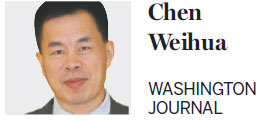US Democratic presidential candidate Hillary Clinton's rhetoric may resonate with her supporters when she talks tough and claims lots of credit, as she did in her national security speech earlier this month, but for people in China, the words ring a bit hollow.
It's a well known truth that politicians like to take the credit and never the blame, but when Clinton said "I wrestled with the Chinese over a climate deal in Copenhagen," it is a pat on the back she doesn't deserve.
Most experts in the field know well that China's strong resolve to fight pollution and climate change is not a result of outside pressure from people like Clinton, but rather the desire of its 1.4 billion people.
In Washington last week, Nick Stern, known for his Stern Review on climate and economics, praised China for being a global leader in the fight against climate change and for its action and ambitious goals in its 13th Five-Year Plan (2016-20).
Clinton loves to tout her experience. "I have sat in the Situation Room and advised the president (Barack Obama) on some of the toughest choices he faced," she said.

What she did not say is that as secretary of state, she was directly responsible for some of the worst decisions he ever made, such as the regime change in Libya in 2011. Libya is in chaos and is now a haven for Islamic State (ISIS) terrorists largely because of US intervention.
The ISIS group itself is largely a byproduct of the US'invasion of Iraq, which Clinton endorsed as a senator from New York.
Despite being accused of all sorts of things by US politicians like Clinton, China has never done anything even remotely as damaging to peace and stability in a country or region.
To many Chinese, Clinton's rhetoric reflects a Cold War, zero-sum mentality, something many people working on China-US relations have warned against. She claims Moscow and Beijing are "deeply envious of our alliances around the world, because they have nothing to match them".
Yet she conveniently avoids mentioning that China by principle is a non-aligned country and the US' alliances are a legacy of the Cold War, which ended more than 20 years ago.
A group of scholars discussing restraint in US foreign policy at the Cato Institute in Washington on June 15 rightly condemned such alliances, saying they had emboldened US allies to take provocative actions in the belief that Washington would always come to their aid.
Clinton also claims that if the US doesn't lead the world, there will either be chaos or other countries will rush in to fill the void, and the choices they make will not benefit the US.
She clearly believes that the US is the savior of the world, and that the world will come to an end without US supremacy. But does that suggest her "presidency" will be one of total US global dominance, leaving no room for the rise of countries such as China, Russia, India, Brazil, South Africa and Indonesia?
Such a mentality is the most likely reason why the US has been engaged in constant wars. Scholars say the US has been at war 93 percent of the time since its founding in 1776. That is literally 222 out of 239 years, meaning the US has been at peace for only 17 years.
It is true that most researchers in China-US relations are worried by the lack of strategic trust between China, a rising power, and the US, the only superpower. But when US politicians like Clinton make these kinds of confrontational speeches, it only makes things worse.
In her speech, Clinton bellowed: "Countries like Russia and China often work against us".
Such rhetoric does not suit someone who aspires to be the president of the United States, especially because she knows China is not the villain and which country is.
Or is she trying to reinforce Americans' misunderstanding of China with a definite purpose?
No one knows how the election will play out, but whoever gets elected in November would do well to abandon the Cold War zero-sum mentality and pursue a path of 21st century win-win cooperation with China.
Contact the writer at [email protected].